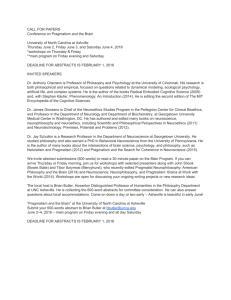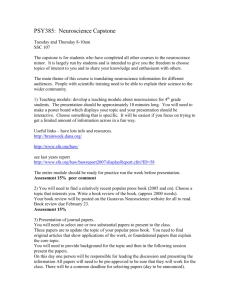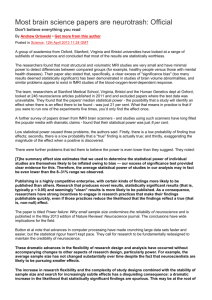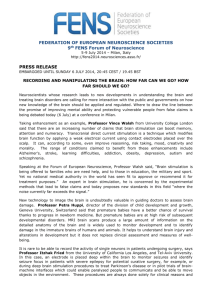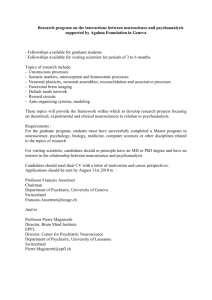Huettel, S. & Sinnott-Armstrong, W., Neuroethics, Duke Univresity
advertisement
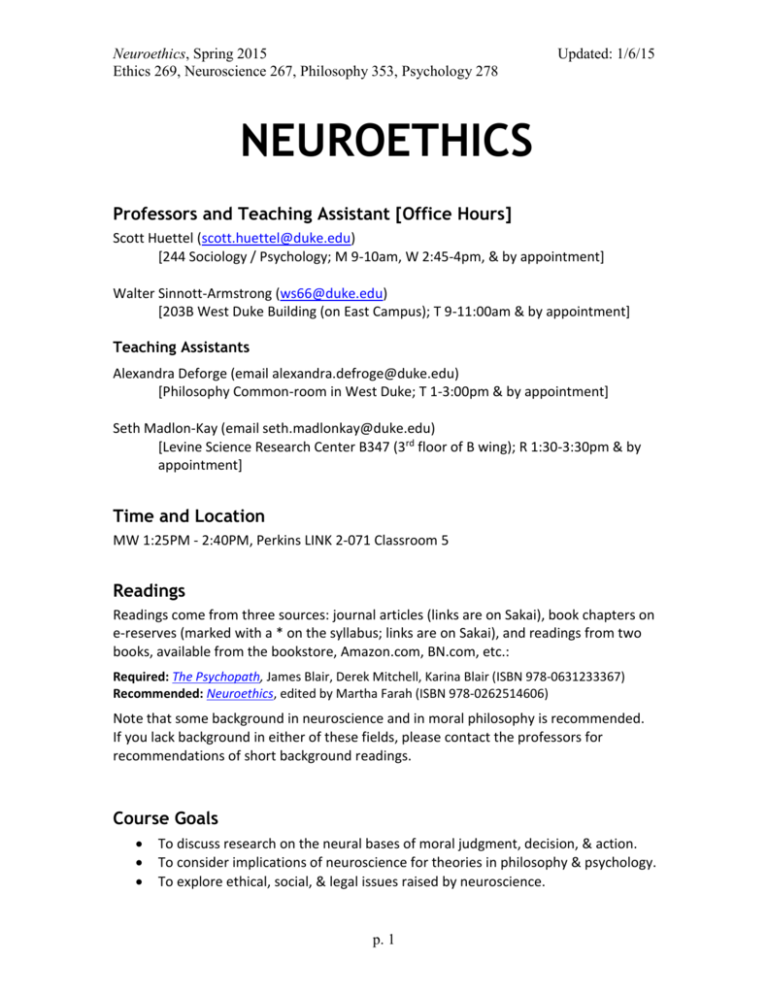
Neuroethics, Spring 2015 Ethics 269, Neuroscience 267, Philosophy 353, Psychology 278 Updated: 1/6/15 NEUROETHICS Professors and Teaching Assistant [Office Hours] Scott Huettel (scott.huettel@duke.edu) [244 Sociology / Psychology; M 9-10am, W 2:45-4pm, & by appointment] Walter Sinnott-Armstrong (ws66@duke.edu) [203B West Duke Building (on East Campus); T 9-11:00am & by appointment] Teaching Assistants Alexandra Deforge (email alexandra.defroge@duke.edu) [Philosophy Common-room in West Duke; T 1-3:00pm & by appointment] Seth Madlon-Kay (email seth.madlonkay@duke.edu) [Levine Science Research Center B347 (3rd floor of B wing); R 1:30-3:30pm & by appointment] Time and Location MW 1:25PM - 2:40PM, Perkins LINK 2-071 Classroom 5 Readings Readings come from three sources: journal articles (links are on Sakai), book chapters on e-reserves (marked with a * on the syllabus; links are on Sakai), and readings from two books, available from the bookstore, Amazon.com, BN.com, etc.: Required: The Psychopath, James Blair, Derek Mitchell, Karina Blair (ISBN 978-0631233367) Recommended: Neuroethics, edited by Martha Farah (ISBN 978-0262514606) Note that some background in neuroscience and in moral philosophy is recommended. If you lack background in either of these fields, please contact the professors for recommendations of short background readings. Course Goals To discuss research on the neural bases of moral judgment, decision, & action. To consider implications of neuroscience for theories in philosophy & psychology. To explore ethical, social, & legal issues raised by neuroscience. p. 1 Neuroethics, Spring 2015 Ethics 269, Neuroscience 267, Philosophy 353, Psychology 278 Updated: 1/6/15 Assignments This course is structured to provide students with control over the grades they earn. Class Participation and Response Paragraphs: (20%) Major aspects of this course will be discussion of original papers and participation in activities during class. You will be required to write a paragraph in response to the week’s reading assignment, to be posted on the course Sakai site no later than noon on Monday or Wednesday, depending on the reading to which you respond. Response paragraphs are required during the weeks of January 12, 19, 26, February 2, 9, 23, March 2, 16, 23, and April 6, 13 (so none are due the first or last weeks of class or the weeks of exams). To get a good participation grade is straightforward: complete the response paragraphs, read assigned articles carefully in advance of the class session, attend class regularly, participate constructively in discussions and class activities, submit assignments on time, and do not be disruptive (e.g., cell-phone use, email, Facebook, Twitter, etc., are not permitted once class begins). Research Paper: (30%) There will be one research paper due near the end of the semester. The paper will be completed in stages: students should submit an abstract and paper plan by 2/27 (5%), should submit a comprehensive outline with citations by 3/27 (5%), and finally the complete version by 4/22 (20%). The instructors will provide guidance about the expectations for the paper throughout the semester. We encourage you to meet with the instructors and/or TA earlier in the semester to discuss potential topics for your research paper. Mid-term Examinations (2/16 and 4/1; total of 25%): The first exam will cover all material covered so far in class and in assignments. The second exam will cover all material in class and assignments since the first mid-term exam. Both exams will consist of short answer and essay questions and will be completed during class without use of books or notes. Final Exam on 5/2 at 2pm-5pm: (25%) The final exam will be comprehensive; i.e., it will cover material from throughout the course. However, its questions will be weighted more heavily toward content from the final third of the course. It will also consist of short answer and essay questions. p. 2 Neuroethics, Spring 2015 Ethics 269, Neuroscience 267, Philosophy 353, Psychology 278 Updated: 1/6/15 Grading, Rescheduling, and Community Standards All requests for changes to assigned grades must be submitted via email to both instructors. The entire assignment or examination will be re-graded, and the resulting grade could be higher or lower. Requests for rescheduling tests and assignment deadlines should be given two weeks in advance, if possible. If you already know of conflicts that will affect your attendance in class or will cause you to miss an examination (e.g., athletic travel), please contact the instructors now. Students are welcome (and encouraged) to study in groups, and many in-class activities will be expressly group-oriented. However, all testing and writing assignments must be done individually. We encourage students with disabilities, including “invisible” disabilities such as chronic diseases and learning disabilities, to talk with one of the professors as soon as possible about appropriate accommodations. Key Dates for the Semester 2/16 2/27 3/27 4/1 4/22 5/2 First Midterm Examination Research Paper: Initial abstract due Research Paper: Comprehensive outline due Second Midterm Examination Research Paper: Final version due Final Examination: 2-5pm Writing assignments should be submitted to Sakai’s Drop Box. Examinations will be given in class without use of books or notes. p. 3 Neuroethics, Spring 2015 Ethics 269, Neuroscience 267, Philosophy 353, Psychology 278 Updated: 1/6/15 Meetings and Readings W 1/7 Introduction: What is Neuroethics? Topics: “My brain made me do it!” Required Reading: Burns & Swerdlow 2003 (read this after the session) Section I: Background in Neuroscience and Ethics M 1/12 A Moral Brain? Topics: Understanding brain structure and function. Early conceptions of brain function. Lessons of Lesions. Phrenology, localization of function, and Phineas Gage. Psychiatric conceptions of the mind. Required reading: MacMillan 1996 (on Gage) Recommended reading: Verplaetse 2009 (on Phrenology) W 1/14 Morality: A Question for Modern Neuroscience? Topics: Take my brain, please! A consideration of the frontal lobotomy. Experimental manipulations of brain function. Modern approaches to understanding function. Required reading: Anderson et al. 1999 Recommended reading: MacMillan 2000 Ch. 5&6*, Finger Ch. 22* Th 1/15 Optional Background Session on Neuroscience (tentative date) M 1/19 Martin Luther King Holiday (No Class) W 1/21 Normative Moral Philosophy Topics: Do consequences or intentions determine what is immoral? Required reading: Mill 1863*, Kant 1785* Recommended reading: Timmons 2002 (pp. 102-129, 151-187) Th 1/22 Optional Background Session on Moral Philosophy (tentative date) Section II: Neuroscience of Moral Judgment M 1/26 Is Morality based on Reason? Topics: Models from Kant and Rawls. Is judging whether an act is immoral analogous to judging whether a sentence is ungrammatical? Required reading: Mikhail 2007 Recommended reading: Hauser et al. 2008a* p. 4 Neuroethics, Spring 2015 Ethics 269, Neuroscience 267, Philosophy 353, Psychology 278 Updated: 1/6/15 W 1/28 Is Morality based on Emotion? Topics: What is Emotion? Manipulating emotion to change moral judgment. Required reading: Greene & Haidt 2002*, Schnall et al. 2008 Recommended reading: Koenigs et al. 2007 M 2/2 Does Neuroscience Lead to Moral Skepticism? Topics: Philosophical implications of the neuroscience of moral judgment. Meta-ethics: moral epistemology and moral skepticism. Required reading: Singer 2005 Recommended reading: Greene 2003, Berker 2009 W 2/4 Positive Morality I: Giving to Others Topics: Other-regarding preferences. Public goods: Why pay for the milk? I like you… I really like you! The “warm glow” of taxation. Undermining intrinsic motivation. Required reading: Harbaugh et al. 2007; Murayama 2010 Recommended reading: Kosfeld et al. 2005; Tankersley et al. 2007 M 2/9 Positive Morality II: Helping others Topics: Social interactions. Cooperation. Altruistic punishment: I’ll hurt you for your own good – or for mine. Required reading: Fehr & Gachter 2002, De Quervain 2004 Recommended reading: King-Casas 2005; Singer 2006 W 2/11 Is Morality Unified? Examples from Justice Topics: Variations across areas of morality (dishonesty, disloyalty, unfairness). Distributive and retributive justice. Hungry orphans and speeding trolleys. Required reading: Haidt & Graham 2007, Parkinson et al. 2011 Recommended reading: Hsu & Quartz 2008, Buckholtz et al. 2008 Th 2/12 Optional Mid-term Review Session (to be scheduled) M 2/16 FIRST MIDTERM EXAMINATION Section III: Neuroscience and Law W 2/18 Does Consciousness Affect Action? Topics: Causality considered. Does the brain anticipate the mind? Do you choose? If not, who does? The veto power: When, whether, how, or why? How far down does the rabbit (hole) go? Required reading: Libet 1999; Haggard 2008 Recommended reading: Libet et al. 1983; Geldard & Sherrick 1972 p. 5 Neuroethics, Spring 2015 Ethics 269, Neuroscience 267, Philosophy 353, Psychology 278 Updated: 1/6/15 M 2/23 Disorders of Consciousness Topics: How many brains do you have? Your body takes matters into its own hands. That’s not my wife, that’s a… Required reading: Gazzaniga 2005; Berson 1983 Recommended reading: none W 2/25 Moral and Legal Responsibility Topic: Actus reus, Mens rea, and Insanity defenses. Does neuroscience undermine assumptions of criminal law? Punishment and its purposes. Required reading: TO BE ANNOUNCED Recommended reading: Morse (5.4 in Farah) F 2/27 ABSTRACT OF RESEARCH PAPER DUE M 3/2 Free Will and Determinism Topics: Determinism vs. fatalism. Incompatibilism vs. compatibilism. What is freedom? What is will? Do we have free will? Required reading: Roskies 2006, Greene & Cohen 2004 (5.2 in Farah) W 3/4 Bypassing and Epiphenomenalism Topics: Do our conscious choices really cause our actions? If not, can we be free or responsible? Required reading: Nahmias 2013a Recommended reading: Bjornsson & Pereboom 2013, Misirlisoy & Haggard 2013, and Nahmias 2013b SPRING BREAK M 3/16 Addiction I: Self-control Topics: What mistakes do addicts make? Wanting vs. Liking. Live for the moment. Curing addiction by cutting out the brain. Required reading: Bechara et al. 2002; Naqvi et al. 2007 Recommended reading: Hyman & Malenka 2001; Section 5.3 in Farah, Schoenbaum et al. 2006 W 3/18 Addiction II: Policy and Institutions Topics: When addicts make good decisions. Paying smokers to quit. Paying heroin addicts to inject. Neuroscience as an agent of policy. Required reading: Bernheim & Rangel 2007 Recommended reading: Chiu et al. 2008 p. 6 Neuroethics, Spring 2015 Ethics 269, Neuroscience 267, Philosophy 353, Psychology 278 Updated: 1/6/15 M 3/23 The Minds of Psychopaths Topics: What are psychopaths? What do they show us about ourselves? Required reading: The Psychopath, pp. 1-18, 27, 45-46, 47-66, 79-80; Instructions for Hare Psychopathy Check-list Recommended reading: the rest of pp. 1-80 W 3/25 The Brains of Psychopaths Topics: Are psychopaths responsible? What should we do with them? Required reading: The Psychopath, pp. 94-95, 107-109, 110-133, 152-155 Recommended reading: the rest of pp. 81-155 F 3/27 COMPREHENSIVE OUTLINE OF RESEARCH PAPER DUE M 3/30 Neuroscientific Evidence in Legal Trials Topics: When is neuroscience reliable enough for legal decisions? When will it mislead juries (or judges)? Required reading: Sinnott-Armstrong et al. 2008, Roskies et al. 2013 W 4/1 SECOND MIDTERM EXAM Section IV: Neuroscience and Society M 4/6 Neuroeconomics Topic: Neuroeconomics: Linking neural and social sciences. Can (and Should) Neuroscience Shape Economic Models? Can your brain make you give to NPR? Required reading: Clithero et al. 2008, Krabjich et al. 2009 Recommended reading: Platt & Huettel 2008, Delgado et al. 2008 W 4/8 Neuromarketing Topics: Paradoxes of choice. Selling to the masses (or to the marketers?). Hidden preferences. Avoiding the “buy button”. Required reading: Berns & Moore, 2011; Venkatraman, in press (to be uploaded) Recommended reading: Ariely & Berns 2010, Plassmann et al., 2008 M 4/13 Neuropolitics Topics: A neuro-political science? Understanding political preferences, one brain at a time. George Bush and the amygdala. “Barack Obama has yet to make an impression.” Predicting the elections. Required reading: Hatemi & McDermott 2011; Stanton et al., 2009; Web-based references (to be announced) Recommended reading: Settle et al., 2010 p. 7 Neuroethics, Spring 2015 Ethics 269, Neuroscience 267, Philosophy 353, Psychology 278 Updated: 1/6/15 W 4/15 Neuroprediction of Crime Topics: Can neuroscience tell us which sexual offenders are dangerous to release? Can it tell us whether violent video games lead to crime? Required Reading: Nadelhoffer et al. 2008, Aharoni et al. 2013 Recommended Reading: Caspi et al. 2002, Canli & Amin (4.1 in Farah) M 4/20 Mind-reading and Lie Detection Topics: Guilty Knowledge. Detecting lies, but not in the eyes. I see your pain. I know what you are planning. Required reading: Wolpe et al. 2010 (4.3 in Farah); Soon et al. 2008 Recommended reading: AAAS collection on lie detection W 4/22 Detecting Consciousness in Patients with Brain Damage Topics: Using fMRI & EEG to detect consciousness in patients with brain damage diagnosed in Persistent Vegetative States. Can we tell whether they are conscious? Should we test them all? Should we ask them about treatment? Required reading: Owen & Naci forthcoming Recommended reading: Laureys (6.1 in Farah) W 4/22 FINAL PAPER DUE Saturday 5/2, 2-5PM : FINAL EXAM (in LINK Classroom) p. 8

